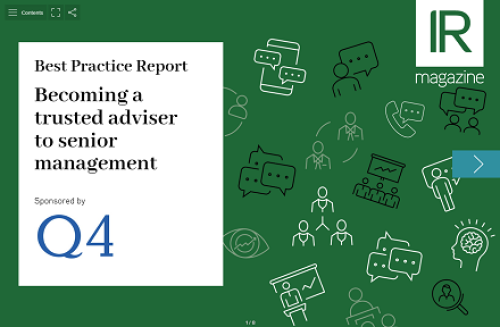The Covid-19 pandemic has enabled parents in IR to spend more time with their children, due to suspended work travel, raising questions about future investor marketing schedules.
The increase in virtual meetings has been a positive development for two thirds of IROs, according to IR Magazine’s forthcoming research report on the impact Covid-19 has had on IR. The majority of respondents also feel positively about spending less time on the road.
In interviews for this article, both on and off the record, working mothers in IR spoke about the trade-offs they had to make before the pandemic in order to have a thriving career and spend time with their children.
‘I’d wake up at 4.00 am to catch a 6.00 am flight and then rush back to be home by 11.00 pm, just to minimize the time away from my kids,’ says Camilla Bartosiewicz, vice president of investor relations at Altus Group, and mother to two children under the age of six.
For Bartosiewicz, her husband – who is the CEO of an investment management firm – and many other working parents, the opening months of the pandemic were especially stressful as strict lockdowns were imposed and parents had to balance professional and personal responsibilities.
Statistically, women are far more likely to be responsible for childcare responsibilities; according to a study of working parents from the Pew Research Center in fall 2020, women were twice as likely as men to say they had a lot of childcare responsibilities.
Bartosiewicz and her husband were eventually able to bring in childcare and, since then, have appreciated the flexibility that remote working has afforded them.
‘There’s a concept of ‘mom guilt’, where you feel like you’re focused on your career and it comes at some cost to your family or your children,’ Bartosiewicz says. ‘The last year has eliminated some of that because I’m physically present while also maintaining focus at work. If I want to go for a 10-minute walk to take my son to school, I can do that.’
Katie Fasken, managing director of investor relations at Slate Asset Management and mother to two young children, expresses a similar sentiment. ‘I’ve felt very fortunate to spend quality time with my kids because I’m not travelling,’ she says. ‘My desire to spend time with them has only increased.’
Nearly eight in 10 IROs and investment community members believe the increase in virtual meetings and events will continue to have an effect on marketing schedules once we can return to work-related travel, according to IR Magazine research.
Both Bartosiewicz and Fasken say they have missed aspects of in-person meetings and believe there’s pent-up demand for meetings that will need to be satisfied when travel returns. But they also say they will think differently about scheduling investor meetings in the future.
‘In the past, we would typically do a lot of our marketing with the CEO, CFO and me,’ Bartosiewicz says. ‘But there will probably be meetings now where I can send my CEO alone – if it’s a relationship where there’s regular contact and I know my CEO is going to be in the same place as the investor. I would be happy to set that up without having to, for example, take a flight to New York to join.’
Fasken adds: ‘I’m particularly focused on raising money for private equity businesses. I’ve never had better interactions with limited partners (LPs). When else would you ever see inside an LP’s house? It immediately breaks down barriers to communication and gives us a shared experience. But at the same time, in private equity, firms have changed their mandate and often that means having to meet the team in its office to close capital. There’s a huge backlog to close once people can travel again.’
Speaking this week at IR Magazine’s Equality in IR Forum, Isabelle Adjahi, vice president of investor relations and sustainable development at Lion Electric and single mother of twins, talked about the importance of boundary setting. She described how, at various points during her career, she would set expectations with management about when she would be working and when she would be spending time with her children. Often this meant working outside of traditional working hours, but she said management was respectful of the boundaries she set, as long as her work was done.
Ultimately, Bartosiewicz believes embracing remote working will make balancing professional and parental responsibilities more manageable in the future. ‘It’s a very positive development for parents – and women, in particular,’ she says. ‘Pre-Covid-19, I think there was this perception that if you’re not in the office, you’re not working hard. I bought into that too, because I felt I wouldn’t be adding as much value if I was out of the office. But that’s been proven wrong – we’ve proven to ourselves that we can deliver in this new environment.’










